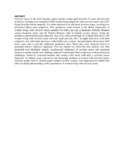Exploring the barriers to health care and psychosocial challenges in cervical cancer management in Kenya.
Abstract
Cervical cancer is the most frequent cancer among women aged between 15 years and 44 years in Kenya, resulting in an estimated 4,802 women being diagnosed with cervical cancer and 2,451 dying from the disease annually. It is often detected at its advanced invasive stages, resulting in a protracted illness upon diagnosis. This qualitative study looked at the illness trajectories of women living with cervical cancer enrolled for follow-up care at Kenyatta National Hospital cancer treatment center and the Nairobi Hospice, both in Nairobi county, Kenya. Using the qualitative phenomenological approach, data were collected through 18 in-depth interviews with women living with cervical cancer between April and July 2011. In-depth interviews with their caregivers, key informant interviews with health care workers, and participant observation field notes were used to provide additional qualitative data. These data were analyzed based on grounded theory's inductive approach. Two key themes on which the data analysis was then anchored were identified, namely, psychosocial challenges of cervical cancer and structural barriers to quality health care. Findings indicated a prolonged illness trajectory with psychosocial challenges, fueled by structural barriers that women were faced with after a cervical cancer diagnosis. To address issues relevant to the increasing numbers of women with cervical cancer, research studies need to include larger samples of these women. Also important are studies that allow in-depth understanding of the experiences of women living with cervical cancer.
Citation
Int J Womens Health. 2015 Aug 27;7:791-8Publisher
University of Nairobi

